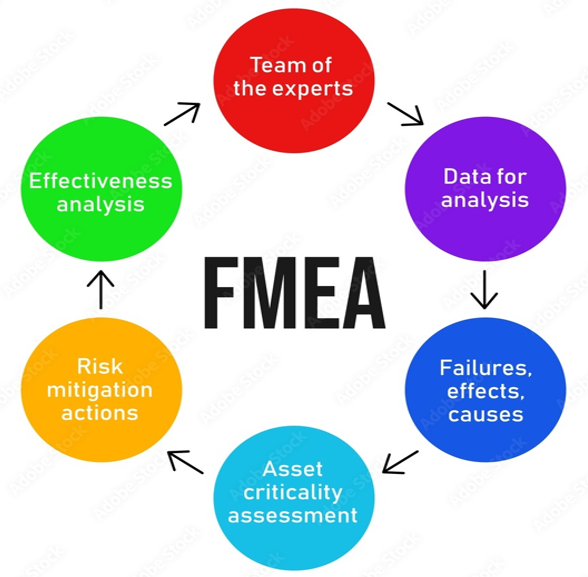FMEA Training
At Swades QMS, we understand that ensuring product/process quality and safety is of utmost importance for any organization. Failure Mode and Effects Analysis (FMEA) is a powerful methodology that allows businesses to identify potential failure points, assess risks, and implement effective preventive measures. By identifying and addressing these potential failure points early on, organizations can significantly reduce the likelihood of costly defects, recalls, and safety incidents. Our FMEA training equips individuals and organizations with the necessary skills to navigate through complex challenges and drive continuous improvement.
With our expertise in providing top-notch FMEA training, designed and delivered by industry experts, we take pride in our proven track record of helping numerous organizations successfully implement FMEA techniques, resulting in improved quality and reduced risk. Whether you are an individual looking to enhance your professional skills or an organization striving for excellence in quality management, Swades QMS’s Comprehensive FMEA Training is your gateway to success. Enroll now and empower your team to proactively address challenges, ensuring enduring quality and safety standards.
Why Choose Swades QMS FMEA Training Program?
Our FMEA training course provides a detailed understanding of the FMEA methodology and its practical application in different industries. Participants will learn the core principles of FMEA, including how to identify potential failure modes, assess risks, and develop effective mitigation strategies. The course covers FMEA in both product and process contexts, ensuring a comprehensive understanding of this essential quality management tool.
Experienced and Certified Trainers
Our trainers are industry experts with extensive experience in quality management and risk assessment. They possess in-depth knowledge of FMEA principles and have successfully implemented FMEA methodologies across various sectors. With their guidance, participants gain insights from real-world scenarios and best practices, enriching their learning experience.
Hands-on Exercises and Real-world Case Studies
We believe in a practical approach to learning, and our FMEA training incorporates hands-on exercises and real-world case studies. Participants will engage in interactive workshops, applying FMEA techniques to analyze and mitigate potential failure modes. Through these practical exercises, attendees will gain the confidence to implement FMEA effectively within their organizations.
Customizable Training Options for Your Organization’s Specific Needs
We understand that each organization is unique, with its specific challenges and requirements. Therefore, our FMEA training program is customizable to cater to the specific needs of your organization. Whether you are a small business or a large corporation, we tailor the training content to address your industry, processes, and goals. This ensures that your team receives the most relevant and impactful FMEA training possible.
FMEA Training Course Content
Module 1: Introduction to FMEA
- Definition and purpose of Failure Mode and Effects Analysis (FMEA)
- Historical background and its evolution in various industries
- Understanding the importance of FMEA in quality management and risk assessment
Module 2: FMEA Methodology
- Overview of the FMEA process and its key steps
- Identifying potential failure modes and effects
- Severity, Occurrence, and Detection ratings: Assessing risk factors
- Calculating the Risk Priority Number (RPN) for prioritization
- Root cause analysis and action planning
Module 3: Types of FMEA
- Design FMEA (DFMEA) vs. Process FMEA (PFMEA)
- When to use DFMEA and PFMEA in the product development lifecycle
- Linking DFMEA and PFMEA for holistic risk management
Module 4: Implementing FMEA in Product Development
- Applying FMEA during the design phase to prevent failures
- Incorporating FMEA into the product validation process
- Integration of FMEA with other quality tools like Six Sigma and Lean
Module 5: Implementing FMEA in Process Improvement
- Using FMEA for process mapping and analysis
- Conducting Process FMEA for existing processes and identifying potential improvements
- Integrating FMEA results into process optimization strategies
Module 6: Risk Mitigation Strategies
- Proactive vs. reactive risk mitigation approaches
- Developing effective risk mitigation and prevention plans
- Validation and verification of risk mitigation measures
Module 7: FMEA Reporting and Documentation
- Creating clear and concise FMEA reports
- Documenting FMEA findings and action plans
- Communicating FMEA results to stakeholders and decision-makers
Module 8: FMEA Best Practices and Case Studies
- Examining best practices for successful FMEA implementation
- Analyzing real-world case studies of FMEA applications in various industries
- Learning from success stories and lessons learned
Module 9: FMEA Workshop and Practical Exercises
- Hands-on exercises to apply FMEA methodology in real-world scenarios
- Group workshops for interactive learning and problem-solving
- Feedback and guidance from experienced trainers
Module 10: FMEA Training Certification and Assessment
- Final assessment to evaluate participants’ understanding of FMEA concepts
- FMEA Training certification upon successful completion of the course
By the end of the FMEA training course, participants will be equipped with the skills and knowledge necessary to conduct FMEA effectively, identify potential failures, assess risks, and implement preventive measures. They will be ready to contribute significantly to their organization’s quality management and risk assessment efforts, enhancing overall product/process quality and safety.
Who Can Attend?
The FMEA training course offered by Swades QMS is designed to cater to a diverse audience of professionals from various industries and roles. The training program is open to individuals and organizations seeking to enhance their knowledge and proficiency in Failure Mode and Effects Analysis. The following groups of people can attend the FMEA training:
- Quality Assurance Professionals
- Engineers and Technicians
- Project Managers
- Risk Management Specialists
- Product Development Teams
- Compliance and Regulatory Professionals
- Anyone Interested in Quality Management
Whether you are an individual seeking professional development or an organization looking to enhance your team’s skills in risk assessment and quality improvement, the FMEA training course is suitable for attendees from diverse backgrounds and levels of experience. The training content is adaptable and can be tailored to meet the specific needs and requirements of each participant or organization, ensuring maximum relevance and practicality.

